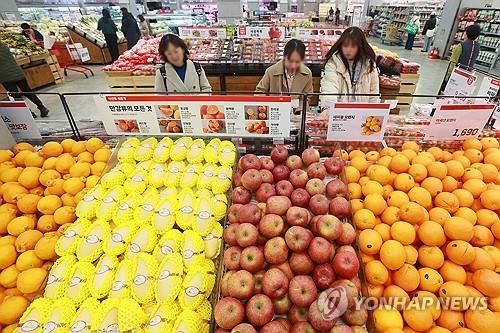- California Assembly OKs highest minimum wage in nation
- S. Korea unveils first graphic cigarette warnings
- US joins with South Korea, Japan in bid to deter North Korea
- LPGA golfer Chun In-gee finally back in action
- S. Korea won’t be top seed in final World Cup qualification round
- US men’s soccer misses 2nd straight Olympics
- US back on track in qualifying with 4-0 win over Guatemala
- High-intensity workout injuries spawn cottage industry
- CDC expands range of Zika mosquitoes into parts of Northeast
- Who knew? ‘The Walking Dead’ is helping families connect
Inflation rises back above 3 pct in Feb. on high fruit, energy prices

Prices of agricultural, livestock and fishery products rose 11.4 percent on-year last month.
Agricultural products, in particular, spiked 20.9 percent, which attributed a 0.8 percentage point increase in the overall inflation.
Of major items, prices of apples and tangerines surged 71 percent and 78.1 percent, respectively, and prices of 18 major kinds of fruits combined surged 41.2 percent last month, the largest increase in more than 32 years.
Prices of industrial products added 2.1 percent, driven by rising prices of imported vehicles, ice cream and clothing.
Prices of petroleum products stopped short of falling 1.5 percent in February, compared with a 5.0 percent decline the previous month amid rising global oil prices.
Dubai crude, South Korea’s benchmark, has risen recently to US$80.88 per barrel, compared with $77.33 in December and $78.85 in January, according to government data.
Service prices increased 2.5 percent on-year in February, slowing from a 2.6 percent rise a month earlier.
Prices of dining out went up 3.8 percent, logging the smallest growth since October 2021.
Core inflation, which excludes volatile food and energy prices, went up 2.5 percent on-year in February, unchanged from the previous month.
Prices of daily necessities — 144 items closely related to people’s everyday lives, such as food, clothing and housing — climbed 3.7 percent last month, the data showed.
The government has said that consumer prices are forecast to ease at a slower pace than earlier expected before reaching its target rate of 2 percent by around the end of 2024.
The finance ministry expected this year’s prices to grow 2.6 percent.
“The government takes the recent inflation situation seriously and will make all-out efforts to achieve the 2 percent inflation level at an early date,” Finance Minister Choi Sang-mok said while presiding over a meeting with ministers concerned.
A record budget of 60 billion won ($44.9 million) will be earmarked to implement farm produce discount programs in March and April to lower fruit prices, and the government will further lower tariffs on imported fruits.
An emergency task force will be running immediately to be in charge of monitoring prices, and any violation in relevant rules will be subject to stern punishment.
Choi also called on companies to join efforts to bring inflation under control, pointing to their reluctance to lower prices of their products though global grain and other prices have eased.











